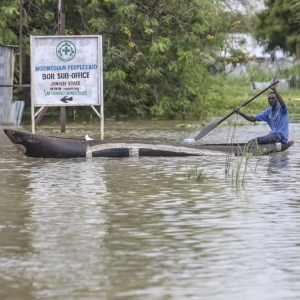Federal Water Tap, November 23: Contaminated Water at Former Air Force Base in Michigan Poses Bigger Risks
The Rundown
A federal health agency updates its analysis of the health risks from contaminated water at a former Air Force base in northeastern Michigan. Senate Republicans released their fiscal year 2021 spending plans. Federal agencies agree to cooperate on invasive freshwater mussels. The Bureau of Reclamation releases a supplemental analysis of a proposal to raise the height of a big California dam. And lastly, USAID outlines its response to Covid-19.
“I see WASH as the fundamental, the existential requirement for any place in which we work.” — Jim Barnhart, assistant to the administrator in the Bureau for Resilience and Food Security, which oversees the U.S. Agency for International Development’s water work. In late October, USAID released an outline of its response to a world upended by Covid-19.
In context: As Global Poverty Rises, USAID Plans for Covid-Altered World
News Briefs
Clean Water Act Violations
The Pittsburgh Water and Sewer Authority was charged with and will plead guilty to violating the Clean Water Act by discharging sewage sludge into the Allegheny River, according to the U.S. Attorney’s Office for the Western District of Pennsylvania.
A water treatment operator was also indicted on criminal charges related to the illegal waste discharges.
Floods Act
The Senate passed the Floods Act, a bill that seeks to improve flood forecasting and risk assessment.
Studies and Reports
Shasta Dam Raise
The Bureau of Reclamation released the final supplemental environmental impact statement for a proposal to raise the height of California’s fourth-tallest dam.
The Trump administration favors increasing the height of Shasta Dam by 18.5 feet, which would increase its storage capacity by 634,000 acre-feet. The dam supplies water to the federal government’s Central Valley Project, which delivers water to farms and cities in the southern half of the state.
Invasive Mussels
The Army Corps of Engineers, Department of Agriculture, and Department of the Interior signed an agreement to coordinate activities to minimize harm from two species of freshwater mussels in the western United States.
Quagga and zebra mussels can be transferred between water bodies by boats and other vessels. The mussels clog water intake pipes and displace native species.
1,4-Dioxane Review
The EPA submitted additional analysis in its risk review of the industrial chemical 1,4-dioxane.
The agency included information about exposure via recreational activities that take place on rivers and lakes. The draft analysis concludes that swimming and other sorts of water activities “present no unreasonable risk” of exposure.
The agency also determined that because the chemical does not readily accumulate in tissues fish consumption is not a high risk.
Contaminated Water at a Former Military Base in Michigan
The Detroit Free Press reports that a federal health agency updated its analysis of the risk of cancer and other diseases in people who were exposed to contaminated water at the former Wurtsmith Air Force Base, in northeastern Michigan.
The Agency for Toxic Substances and Disease Registry found that exposure to two chemicals in water from drinking, showering, and bathing increased the risk of various health problems. For benzene, those consist of cancer and heart deformations. For trichloroethylene, it is acute myeloid leukemia, which is a form of bone marrow cancer.
Veterans who served at the base, their families, and residents of neighboring Oscoda continue to deal with the legacy of other chemical contaminants stemming from the base. They include PFAS compounds, which have polluted the area’s lakes and rivers in addition to the people.
In context: Fear and Fury in Michigan Town Where Air Force Contaminated Water
On the Radar
Senate Spending Bills
Senate Republicans released their fiscal year 2021 spending plans. The budget for the U.S. Environmental Protection Agency would be just under $9.1 billion, which is roughly the same as its current funding.
Funding for the two main federal lending programs for water and sewer infrastructure would remain constant as well.
House and Senate leaders must agree to a budget before a continuing resolution expires on December 11.
Federal Water Tap is a weekly digest spotting trends in U.S. government water policy. To get more water news, follow Circle of Blue on Twitter and sign up for our newsletter.
Brett writes about agriculture, energy, infrastructure, and the politics and economics of water in the United States. He also writes the Federal Water Tap, Circle of Blue’s weekly digest of U.S. government water news. He is the winner of two Society of Environmental Journalists reporting awards, one of the top honors in American environmental journalism: first place for explanatory reporting for a series on septic system pollution in the United States(2016) and third place for beat reporting in a small market (2014). He received the Sierra Club’s Distinguished Service Award in 2018. Brett lives in Seattle, where he hikes the mountains and bakes pies. Contact Brett Walton







Leave a Reply
Want to join the discussion?Feel free to contribute!